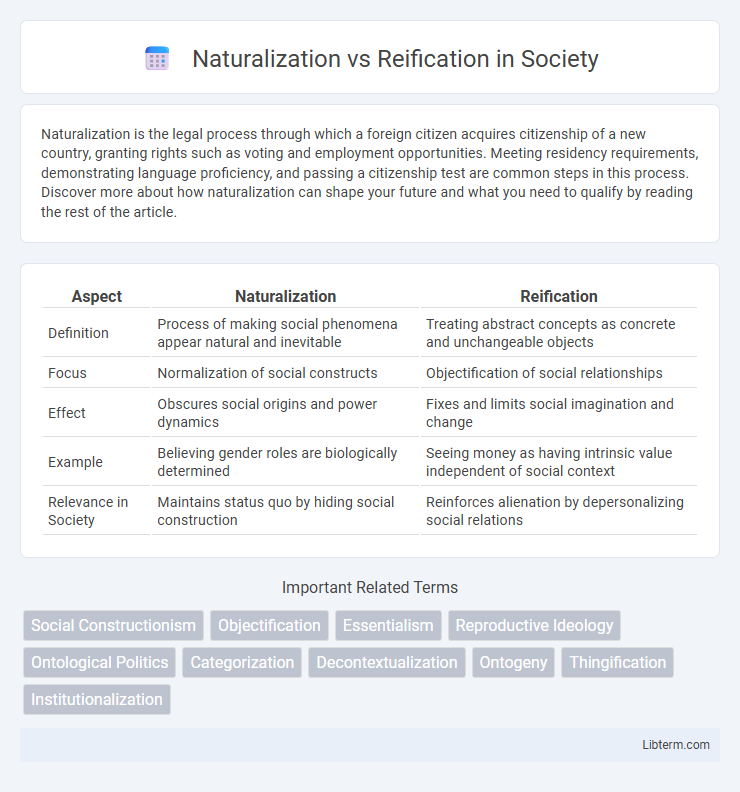Naturalization is the legal process through which a foreign citizen acquires citizenship of a new country, granting rights such as voting and employment opportunities. Meeting residency requirements, demonstrating language proficiency, and passing a citizenship test are common steps in this process. Discover more about how naturalization can shape your future and what you need to qualify by reading the rest of the article.
Table of Comparison
| Aspect | Naturalization | Reification |
|---|---|---|
| Definition | Process of making social phenomena appear natural and inevitable | Treating abstract concepts as concrete and unchangeable objects |
| Focus | Normalization of social constructs | Objectification of social relationships |
| Effect | Obscures social origins and power dynamics | Fixes and limits social imagination and change |
| Example | Believing gender roles are biologically determined | Seeing money as having intrinsic value independent of social context |
| Relevance in Society | Maintains status quo by hiding social construction | Reinforces alienation by depersonalizing social relations |
Understanding Naturalization and Reification
Naturalization refers to the process by which social constructs or ideologies are perceived as natural and immutable, obscuring their historical and cultural origins. Reification involves treating abstract concepts or social relations as concrete, tangible things, leading to a misunderstanding of their complex, dynamic nature. Understanding naturalization and reification requires recognizing how they perpetuate misconceptions by masking underlying social processes and power structures.
Defining Key Concepts: What is Naturalization?
Naturalization refers to the process of making a social or cultural phenomenon appear natural, inevitable, or biologically determined, thereby obscuring its historically constructed and contingent nature. It involves treating socially constructed categories, such as race or gender, as if they were innate, fixed realities rather than fluid and context-dependent. This concept plays a crucial role in critical social theory by highlighting how power relations are maintained through the illusion of naturalness.
Defining Reification: An Overview
Reification refers to the process of treating abstract concepts, relationships, or social constructs as if they were concrete, tangible entities. This semantic shift often leads to the mistaken perception that these constructs have an independent, objective existence outside of human cognition and social context. Understanding reification is essential in analyzing how language and thought shape our perception of reality, distinguishing it from naturalization which involves perceiving social phenomena as natural or inevitable.
Historical Contexts of Naturalization and Reification
Historical contexts of naturalization often involve the normalization of social and cultural phenomena that become accepted as inherent or inevitable, particularly during periods of colonialism or nation-building. Reification historically emerges within Marxist theory, where social relations and human actions are objectified into commodities or seemingly autonomous entities, obscuring underlying power dynamics. Both concepts highlight how historical processes shape the perception of social realities, influencing ideologies and institutional structures over time.
Theoretical Foundations: Key Thinkers and Frameworks
Naturalization in philosophy, influenced by thinkers such as Willard Van Orman Quine, seeks to ground epistemology and cognitive processes within empirical science and naturalistic frameworks. Reification, extensively analyzed by Georg Lukacs and Theodor Adorno within Marxist theory and critical theory, critiques the process of treating abstract concepts or social relations as concrete objects, highlighting alienation and commodification in capitalist societies. These theoretical foundations illuminate the contrast between explaining phenomena through natural sciences and understanding distortions in social consciousness through dialectical critique.
Naturalization in Everyday Life
Naturalization in everyday life refers to the process by which social constructs are perceived as natural, unquestionable realities, shaping how people interpret identities, roles, and norms without awareness of their socially constructed origins. This phenomenon reinforces dominant ideologies by masking power dynamics and making cultural and social practices seem inevitable or biologically determined. Recognizing naturalization is crucial for critically analyzing societal structures and promoting social change by uncovering the constructed nature of what is often seen as "common sense.
Reification in Social Structures
Reification in social structures refers to the process by which abstract concepts, relationships, or social constructs are perceived as concrete, immutable objects, often obscuring the underlying human actions and social dynamics. This phenomenon leads to the treatment of institutions, norms, and roles as fixed entities rather than products of collective human agency and historical context. Understanding reification is crucial for analyzing power dynamics and social change, as it reveals how social realities become naturalized and resistant to transformation.
Impacts on Identity and Social Perception
Naturalization solidifies identities by portraying social roles or behaviors as inherent and unchangeable, which often reinforces stereotypes and limits individualagency. Reification treats abstract social concepts as concrete realities, shaping social perception by obscuring the fluidity of identity and perpetuating rigid social categories. Both processes influence identity formation and societal attitudes by embedding fixed meanings into social interactions, thereby affecting how individuals see themselves and are seen by others.
Comparing Effects: Integration and Alienation
Naturalization frames social constructs as inherent and unchangeable, promoting integration by fostering a sense of shared identity and stability. Reification treats these constructs as fixed objects, which can lead to alienation by obscuring the dynamic and negotiated nature of social reality. This comparison reveals how naturalization reinforces social cohesion, while reification tends to fragment social understanding and increase detachment.
Challenging Naturalization and Reification in Modern Discourse
Challenging naturalization and reification in modern discourse entails critically examining the ways social constructs are presented as natural or immutable, thereby revealing hidden power dynamics and biases. This approach disrupts the taken-for-granted assumptions embedded in language, enabling more reflective and inclusive conversations about identity, culture, and social structures. By interrogating these processes, scholars and activists foster critical awareness and promote transformative societal change.
Naturalization Infographic

 libterm.com
libterm.com